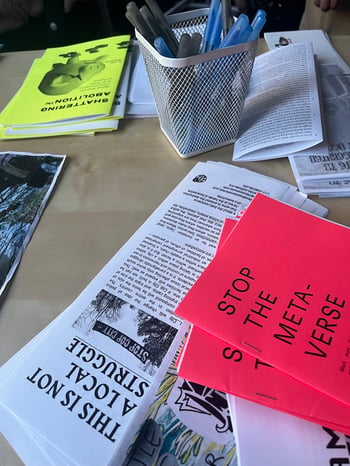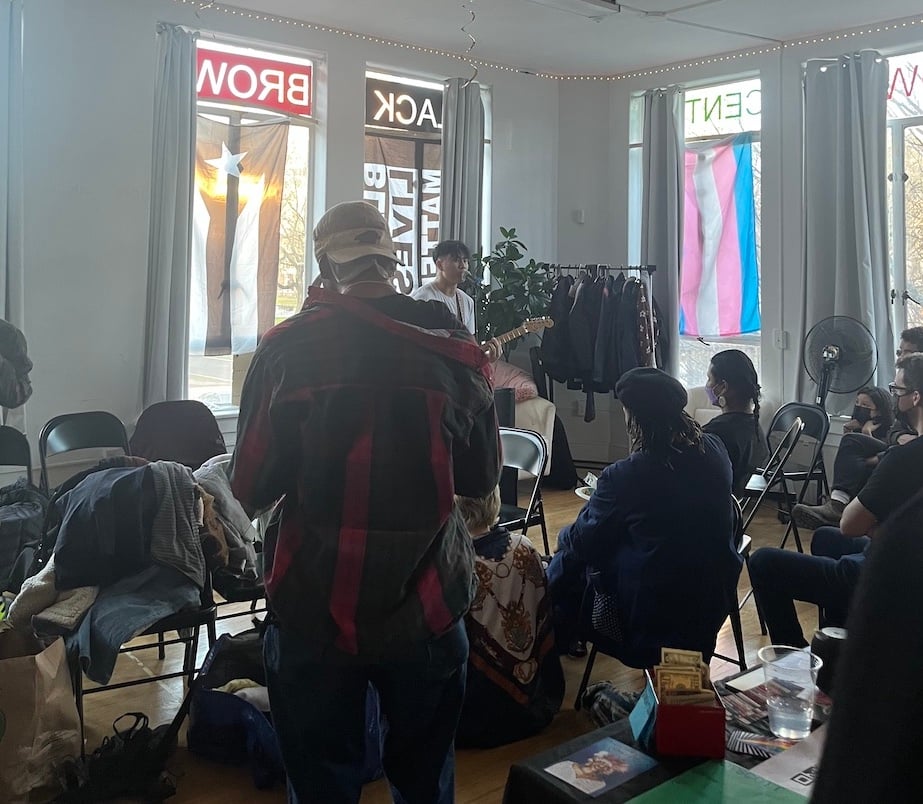 Inside the Black and Brown Power Center on Chapel Street, Evan Fritz could see a new attendee coming toward the door. From where he stood inside the room, he scrambled over to the entrance, grabbing a chair as he ushered him into the space.
Inside the Black and Brown Power Center on Chapel Street, Evan Fritz could see a new attendee coming toward the door. From where he stood inside the room, he scrambled over to the entrance, grabbing a chair as he ushered him into the space.
“I think everyone’s a friend,” he said a little bashfully when asked about the gesture.
That spirit of community personified an arts-focused “Stop Cop City” fundraiser last Sunday afternoon, as activists, artists and community organizers raised funds for Atlanta-based, self-described “Forest Defenders” who have been fighting a proposed $90 million, 85-acre training facility for law enforcement in the South River Forest just outside Atlanta for the past year. In particular, funds went toward activists who have been arrested and are on or awaiting trial.
Held at Citywide Youth Coalition’s (CWYC) 928 Chapel St. headquarters and catered by Vegan Caribbean Style (formerly Ninth Square Caribbean), the event brought in tens of attendees over five hours of poetry, music, and film screenings. It is not the only action in New Haven: a group of Connecticut elders has also vocally opposed the development. It raised between $800 and $1,000 for the Atlanta Solidarity Fund.
“I think people came out today because they understand that Cop City is a threat to working people, Black people, to immigrants as it's a major escalation in the militarization of police,” said Fritz, one of the organizers of Sunday’s event. “On the one hand there's the community in Atlanta, all around the country, all around the world, that is the target of police repression, and on the other hand there’s big corporations like the groups that are funding the Atlanta Police Foundation and the cops themselves, and the state."
The fundraiser came as tensions in Atlanta, which have simmered and escalated for over a year, reached a head this winter and spring. In January, 26-year-old organizer Manuel Esteban Paez Terán—or as they were affectionately known, Tortuguita—was shot and killed by police after refusing to leave the area where they had been staying in the forest. In the weeks since, activists have spoken about police intimidation and forced removal of both people and belongings from the space.
Sunday, that support came through the event, from a poetry performance to a screening of the film Riotsville, U.S.A. Inside, ambiance was that of a make-shift family, as though every attendee knew their peers were chums by virtue of their attendance. Most people wore masks, and introduced themselves to strangers. One spectator sat knitting as Riotsville, U.S.A. rolled.
Riotsville, U.S.A.’s political legacy is braided into its cinematic footprint. Directed by Sierra Pettengill and released by Magnolia pictures last year, the film uses archival news and military footage to tell the story of the U.S. Military-Industrial Complex, and specifically the creation of fake towns dubbed “Riotsvilles,” where police could simulate their responses to civil unrest in real time, in the 1960s.
During the movie screening, attendees whooped and shook their heads, occasionally bemoaning the woes of leftist organizing. They noted governmental abuses and mistakes, watching as part of their story seemingly played out on screen.

Sarai Pridgen Photos.
Every so often, organizer Fiona McElroy helped apprehensive attendees into chairs. Now a main force behind the fundraiser, McElroy been organizing in Connecticut since last summer, as a member of an EcoSocialism Working Group within the Connecticut Democratic Socialists of America (DSA). When asked about her involvement, she emphasized the urgency she felt in the face of police violence.
"It’s really indicative of how the state plans to respond to future protests against police brutality, against destruction of the forests, and against climate change, and any number of other issues,” she said.
She added that the fundraiser was one response to that future she fears. At the fundraiser, attendees could donate online or with cash and peruse a pamphlet table. There was a letter writing station to reach those incarcerated, with BIC pens and stationary included. Also laid out were choice reading selections, such as How to Blow Up a Pipeline by Andreas Malm.
Over a whiteboard, a collage of trees kept track of donations, with each tree representing an individual’s contribution. The event’s value lay in disseminating information as much as it was fundraising, the organizers did everything to keep attendees abreast of the current legal battle, the status of those incarcerated, and to give historical context.
After the film screening and phone call from an Atlanta-based activist, a guitarist took over the speaker system. Attendees formed an informal semi-circle on the floor, or in chairs, nodding their heads to melodic indie-freestyle guitar and song.
During an intermission to the music performance, a member of the crowd stood and read an original poem from their phone entitled “We Are Our Greatest Resource.” In a mask and a beanie, their quiet presence remained powerful. Onlookers hushed to pay attention, and even without a microphone the voice of the poet reached across the room. The ethos was simple: solidarity is power.
Though many in the audience were new to activism, or were deeply involved in New Haven’s local networks, others had actually participated in the movement down South. One activist, who asked to remain anonymous, went to Atlanta with friends during a recent “week of action” mobilization. He said the experience felt eye-opening, and felt energized by those pushing to such extremes to keep the land safe.
“They believe infallibly that this is what is just, and that the pursuit of justice and equality is meant to prevail,” he said. He agreed the atmosphere of this Stop Cop City coalescence was that of support, mutual-aid-and-respect—one of the Black and Brown Power Center’s tenets, written on the chalkboard wall. “Everyone wants you to feel heard and wants to be heard as well.”